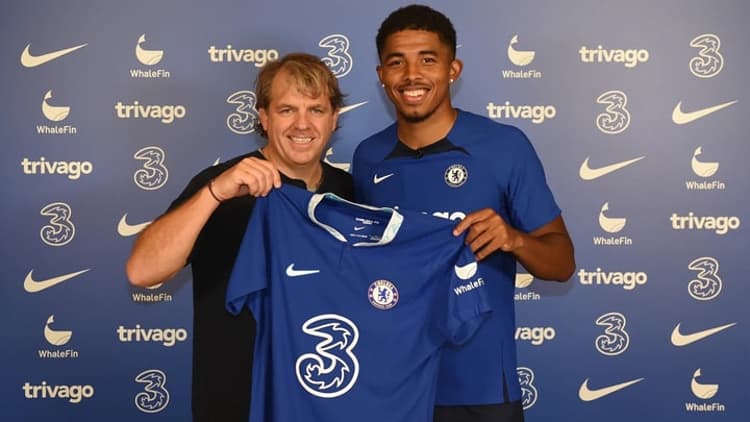-
Nieuws
- 19 minutes ago
Mudryk, Badiashile and now Enzo Fernandez: How Chelsea are dodging FFP

Chelsea’s spectacular spending since the summer has changed the landscape of the transfer market, but has led to fans to question how they are avoiding Financial Fair Play (FFP) penalties.
The Blues made a world record spend in the summer and have followed that up with a spectacular January transfer period. Mykhailo Mudryk has been their biggest acquisition to date, yet that could be surpassed if they are successful in their late bid to get Benfica midfielder Enzo Fernandez to the club.
The Portuguese side have been steadfast in their instance that Chelsea must pay €120 million for a player they signed for a tenth of that in the summer, and as the deadline approaches, there is an increasing likelihood that they will do just that.
PROFILE: Gusto is one of Europe's biggest full-back prospects
But with Chelsea once again active just after completing a €35m deal to sign Malo Gusto from Lyon, it has raised fresh questions over the sustainability of their transfer business with regards FFP.
CBS Sports’ Ben Jacobs has exclusively explained the thinking behind the Blues work...
"Lots of Premier League clubs have got strong relationships with Chelsea because Todd Boehly is active in the market and has made sure in the previous window that he's made the necessary introductions. So we shouldn't see Chelsea's high spending and getting involved in a lot of transfers as necessarily aggravating the market as much as is being painted.
Everybody that is dealing with Chelsea is quite wowed by their ambition, and if you're prepared to sell and you're dealing with Chelsea, you're also quite happy because you believe you're going to get a good rate.
MORE: How Chelsea could line up if Jose Mourinho returns for third spell
If the opportunism is there, people are not pushing Chelsea away; in the same way that Benfica engaged when they first said that they wouldn't on Enzo Fernandez; in the same way that Paul Barber, the Brighton CEO says: 'If it's the right time we will sell for the right price.' Chelsea may give clubs the opportunity to cash in.
Of course people want to engage and have a strong relationship with Chelsea, it just remains to be seen how much more business they can get done.
Welcome to Chelsea training, Mykhailo Mudryk 🥶 pic.twitter.com/2lVb9bPn76
— Football Transfers (@Transfersdotcom) January 18, 2023
How Chelsea are beating FFP
FFP isn’t Chelsea’s main worry, although that could catch up with them in future transfer windows, but they've always generated income from their youth and that's why they invest so much season on season into their academy.
It's more a mix of a variety of things, business needs and cash flow needs, especially if you're taking the money if you have to make upfront payments from a revolving credit, that's one aspect.
And then flash forwards over three or four or five windows, Chelsea are going to be modernising the whole football club, including the renovation of Stamford Bridge. All of these are factors on the business side. And so obviously is any money that they need to build their multi-club model.

Why big transfer fees don't scare Chelsea
With FFP, when you declare the fees you're paying on the books, it doesn't really matter in the most basic of terms whether it's the one payment high fee, whether it's a staggered payment or whether the fee is a little bit higher than you wanted to pay or a little bit lower because Chelsea has got these long contracts.
Under FFP the fee is declared based upon the contract length, which is ultimately why Mudryk is a seven-and-a-half-year deal with a further one year option, so eight and a half years. That allows Chelsea to declare the fee over three FFP cycles, which last three years each.
The actual annual outlay and cycle outlay on the books is a lot lower and that means that they can still do more business. But if those fees linger on the books and they continue to spend and spend and spend in this way, then each of the smaller fees divided over long-term contracts will start to add up.

Not every player wants these long-term contracts. If your only way of getting the big deals done is to offer seven, eight, nine-year contracts, then sometimes the player doesn't want to sign up for that. As a consequence, you can be in a weaker position over time within the market.
Fundamentally, Chelsea have got a belief as they build their multi-club model and as they sign more youth players and as they potentially sell some of those players that maybe don't make it to the Chelsea first team, that they over the next few years will generate more income.
This isn't only about how do we creatively make the maths work under FFP, it's about the fact that over time Chelsea believe that it will be even less of a concern. If they can qualify for the Champions League, if they can build on the Abramovich success on the football field, if they can lower the wage bill and have more incentive-driven contracts and if they can start investing in other football clubs and building a multi club model - plus cashing in on the youth, whether they work on the field or don't - then they'll have more leeway because there'll be even more income coming into the football club.
The renovation of the stadium, even though that will have an outlay is going to be a part of that as well, because if it works and then you generate more money on match days and also non-football income, then once again over time you've got a steady stream of income.
That renovation of the stadium could come with things like naming rights deals or be more lucrative to prospective sponsors, especially, if you don't just have Chelsea men, more Chelsea women games, music, concerts, things like Tottenham have done like the NFL, all of these, once again allow you to bring in more and when you bring in more, you have more leeway under the rules of both the Premier League's profit and sustainability and UEFA’s FFP."



















